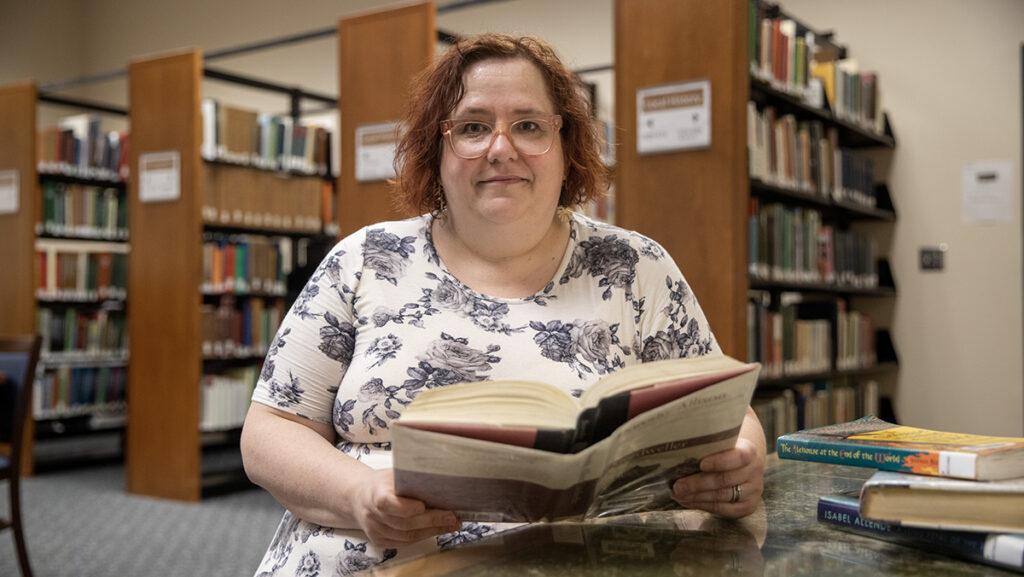The Tompkins County Library Foundation held its 11th Annual READATHON to stir up support and donations, which some participants used as an opportunity to act in defiance of book bans in the United States.
The readathon hosted virtual and in-person readers from the community and surrounding colleges to read their book selections out loud to a public audience. Readers are sponsored by community members to read during the event using an online fundraising platform.
Ithaca College Librarian Michelle Millet; Communications Librarian Cathy Michael; Terri Ledbetter, acquisitions and invoice specialist for the Ithaca College Library; and Web Services Librarian, formed a team of readers for the event.
Michael chose to read “Why Read?” to share her love of literature.
“I was an English major as an undergraduate and still love literature,” Michael said. “Books are transformative and the book explores that from a teacher’s perspective.”
Millet said this is the first year the college assembled a team to support the readathon, but she looks forward to collaborating with the Tompkins County Library in the future.
“[The downtown library director and I] started talking about how we can collaborate,” Millet said. “So we created a library team at Ithaca College with some of my library staff and this is the first time they’ve done something like a library team. I’m hoping we can find other ways to collaborate. I would love to get our students to sign up for library cards.”
The money is raised for the Tompkins County Library Foundation to support library operations, like purchasing new materials. The campaign raised just over $23,000 in donations. President La Jerne Cornish also participated and raised $1,000 and the Ithaca College library team raised $540.
Some readers used the readathon as a chance for empowerment in protest of bans placed on content focusing on LGBTQIA+ and other related issues.
Veronica Pillar, Tompkins County District 2 legislator, said the pressure libraries have faced fueled her decision to read, “Transverse: We Won’t Be Erased!” and “Fight Like Hell: The Untold History of American Labor,” about a teenage transgender couple and unionization efforts, respectively, at the readathon.
“There has definitely been a rise in transphobia and anti-trans stuff and it’s been targeted at libraries,” Pillar said. “That’s one of the reasons I wanted at least some of my reading to be something celebrating transness.”
Across the nation, libraries are facing increased scrutiny over the circulation of books related to critical race theory, those featuring LGBTQIA+ characters and other related themes. This comes as many states, like Florida, and even local municipalities in New York, have begun banning certain titles from library shelves. When bans are challenged in court, librarians are attacked and harassed; one county in Texas considered shutting down the library system rather than returning books to circulation.
Millet said via email that now is a very difficult time to be a librarian.
“There’s an article from not long ago that’s called ‘The Librarians Are Not Okay,’” Millet said. “And it’s about public librarians being harassed, threatened, etc. You know, it‘s way more serious than I think some people realize.”
Kerry Barnes, executive director of the Tompkins County Library Foundation, said that the recent pressure libraries have faced has empowered the readathon.
“One of the things that made our readathon powerful is that a lot of our readers choose to read from banned or challenged books,” Barnes said. “They feel that there’s a lot of power in speaking out loud into a microphone, words that other people don’t want you to know.”
In Florida, proponents of book bans, like Governor Ron Desantis, supported the bans by claiming they increase parents’ rights over their children’s education. Those opposed to banning books are of the opinion that book bans are rooted in censorship and often discrimination.
Barnes said the library has been shielded from most scrutiny, largely because of its location in the more liberal city of Ithaca, however, she said there are limits to the influence of the city.
“There’s nibbles at the edges of the bubble,” Barnes said. “So we take our freedom of information and reading seriously — it’s a scary time.”
For others, the readathon was a chance to connect with the community. Raul Palma, associate dean of the School of Humanities and Sciences, read at the readathon with his daughter.
“We love the library and we started reading during the pandemic,” Palma said. “We thought it was a great way to stay connected and last year we started reading because we love to read with one another.”
Pillar said one of her favorite parts of the readathon is also being able to engage with the community.
“One of the things I really value is this sustained connection with the community and groups that care about what our local government is doing, like the library,” Pillar said.
Barnes said the library is trying to recreate itself to maintain engagement with the community in the digital 21st century.
“Libraries are doing such great things, we have something called a ‘Library of Things’ and it’s everything from reading glasses, phone chargers, but then also New York State Parks passes you can borrow with your library card,” Barnes said. “It really is an interesting way of rethinking how we borrow and lend items in our community and the libraries are at the forefront of that.”
Students attending any of the local colleges or universities are able to get a library card at the Tompkins County Public Library. Barnes also said one of the biggest misconceptions about the library is that they only offer books.
“It goes so much farther beyond just materials for reading,” Barnes said. “It’s also for learning and for entertainment — it is how we keep ourselves informed and grow.”








